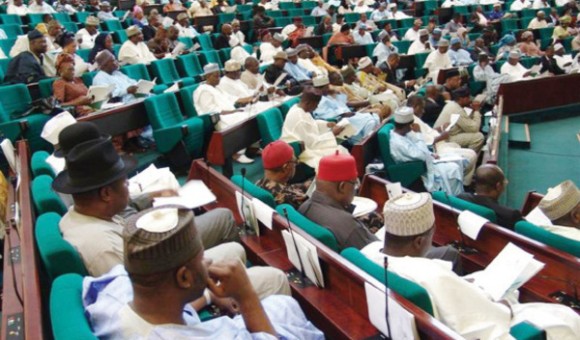
The House of Representatives, on Wednesday stopped the move to raise a Federal Government’s secured bond of N309 billion to finance the outrageous shortfalls in the Nigerian electricity market.
The House also directed the Federal Ministry of Power, Works and Housing and the Nigerian Electricity Regulatory Commission (NERC), Nigerian Bulk Electricity Trading (NBET) to immediately stop the move to raise the bond.
This came just as the House mandated its Committees on Power, Privatisation and Commercialisation, Aids, Loans and Debts Management to investigate the usage of the N213 billion intervention fund provided by the Central Bank of Nigeria (CBN) in 2015, through the Nigerian Electricity Sector Intervention facility.
These resolutions followed the adoption of a motion moved by Honourable Edward Pwajok (Plateau-PDP), which was unanimously adopted by members through a voice vote by the Speaker, Honourable Yakubu Dogara.
While moving the motion at the pelnary on Wednesday, Honourable Pwajok expressed deep concern that the planned massive borrowing was in spite of the intervention by the Central Bank of Nigeria (CBN) in March 25, 2015 through the grant of a bail out.
According to the lawmaker, “the bail out was to the tune of N213billion through the Nigerian Electricity Sector Intervention (NESI) facility.”
“In spite of that intervention, the shortfall, instead of being wiped out, has continued to escalate at the rate of about N15 billion per month (equivalent to N500 million daily).rising to a total-market shortfall ofN400 billion as of December 31, 2015.
“A continuing incidence of market shortfall is a distinctive action for new investors to venture into the Nigerian electricity market, the implication being that the projected generating capacity expansion is an illustration since any increment in generating capacity would further escalate the market shortfall,” he noted.
Honourable Pwajok lamented that Distribution Companies (DISCOs), which collected revenues, failed to remit in full to other market participants without any measures put in place by the NERC to block the leakages.
While noting that there were no penalties for defaulters, he expressed concerned that in spite of no noticeable improvement in the electricity sector, either in the area of generation, transmission or distribution, tariffs had been increased twice since 2013.
Contributing, Honourable Chris Azubogu said the NERC was not doing much, adding that year in year out it sought for bailout from the Federal Government.
Also another lawmaker, Honourable Johnson Agbonayinma (Edo-PDP), while contributing, described the current situation as “a total failure to the Nigerian people, which should be immediately tackled.”
According to him, “there are a lot of questions as to how the bail out, to the tune of N213 billion, was utilised, we need to call on the CBN Governor to come and explain what the N309 billion bond will be used for.’’
After several contributions from members, the House urged NERC to devise a monitoring mechanism to measure and enforce full monthly remittance by DISCOs, recoup all miss-appropriated funds that resulted in the accumulated market shortfalls.
According to the House, NERC should also apply sanctions for any defaulter, including the threat to withdraw the licences of erring DISCOs.
The House further mandated its Committee on Power, Privatisation and Commercialisation and Aids, Loans and Debt Management to investigate the matter and report back to the House within six weeks.
Source: Tribune
